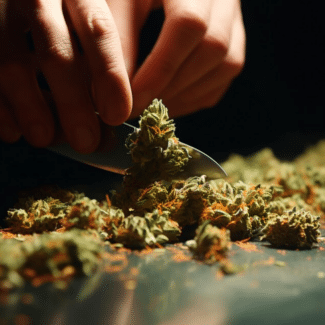
Happy 10-Year Cannaversary, WA! — What We’ve Learned
Happy Cannaversary, Washington! The state rang in the big 1-0, closing out the first decade of recreational cannabis. This celebration is also meaningful because it marks a decade of recreational cannabis access in the United States. In that time, much has changed — some things are the same as they ever were. Washington was the first state in the nation to create an adult-use market back in 2012, and since then, 21 more states have come online — with more predicted to join this year.
Let’s Celebrate Washington’s 10-Year Cannaversary!
Washington had a long history of being cannabis-friendly, having legalized medical cannabis way back in 1998. Still, taking the step to becoming the first place to allow unconditional access to the plant for anyone over 21 was groundbreaking. In November of 2012, residents of Washington state voted to legalize recreational cannabis. In doing this becoming the first state in the nation to create an adult-use market. Legal Washington cannabis paved the way for the rest of the country.
The 10-year mark is a big one for a fledgling industry, and the Washington cannabis industry celebrated. Ringing in around $1.5 billion at the end of 2022. Despite challenges, the industry is expected to grow, with some estimates reaching $2.3 – $2.5 billion by 2026.
During this time, there have been soaring highs and challenging lows, like when the Washington State Liquor and Cannabis Board removed the online map of licensed producers due to a string of break-ins. Technological breakthroughs saw new software, back-end system management, and processing equipment come online. Systems were created, and the market navigated, breaking the waves in the stormy sea of legal cannabis.
Yet despite these changes and leaps forward, the more things change, the more they stay the same. Some of the challenges cannabusinesses face today are the same ones they faced a decade ago. Federal legalization hasn’t moved forward in the last ten years, save for Biden’s recent pardon of federal cannabis charges. The stigma and confusing legal status mean that cannabusiness owners are still at increased risk of theft. Continuing to face barriers to raising capital and finding safe banking.
Cannabis Continues to Face Capital Challenges
Federal prohibition of cannabis has been a challenge businesses have had to navigate since 2012, and the lack of movement can be frustrating. This stamp of disapproval from the federal government has made banking institutions wary of financing or holding accounts with people in the legal market.
Things looked like they may turn around in 2017 when the SAFE Banking Act was first introduced. The Act would move the industry from a cash-only model by opening access to essential financial services and prohibiting federal regulators from refusing legal cannabis businesses. Since 2017, the Act has been introduced six times and failed three, most recently in December 2022.
There’s also 280-E, the IRS clause that stipulates illegal businesses (as cannabis is still federally considered) cannot take federal tax deductions for costs of doing business, meaning cannabis companies have to take a much heavier hit than other industries every year.
But things have improved in cannabis in Washington (and across the country) in the past ten years. More cannabis investors are looking for specific types of businesses, and it’s easier than ever to find a cannabis investment firm. New financing options like Bespoke Financial have also come online to fill the specific gap in cannabis capital. Bespoke Financial takes the guesswork out of finding cannabis banking solutions, helping you quickly get the coverage you need.
Oversupply and Low Wholesales Prices Threaten the Industry
A problem that is not unique to Washington cannabis but is common in long-running markets is oversupply. More and more cultivators have come online, resulting in cannabis prices hitting all-time lows. This year farmers had a bumper crop, or a robust harvest, thanks to favorable weather conditions. Simply put, the Washington market is flooded with weed.
Oversupply and low prices are the most complicated challenges for small craft growers. Craft growers aren’t yet allowed to sell directly to consumers, and these small businesses have to fight for space on crowded shelves at prices that may not let them make a profit.
But government officials are considering changing this regulation. Washington lets craft breweries and wineries sell directly to customers, and the same board regulates both industries. This approach would help alleviate some of the cost crunches. People can develop relationships with craft cannabis growers and develop brand loyalty as they do with beer, wine, and spirits.
Minority Cannabis Entrepreneurs Struggle to Find Opportunities
Another challenge that isn’t unique to cannabis is the barriers to entry for minority business owners. Black business owners faced massive financial and regulatory obstacles as the legal market grew. While the war on drugs disproportionately affected minorities, no one group was more affected than Black communities.
The cannabis industry in every state is highly regulated, which makes understanding the regulations and the necessary paperwork crucial. Having previous experience dealing with government entities is a leg up. It’s sometimes unclear how to move through a licensing process, and often the decision-makers have people in their ears pulling for specific outcomes. Finding your footing can only seem possible if you are connected and wealthy.
Additionally, having cannabis charges or previous jail time can work against you. Washington state uses a scoring system to rank license applications, and jail time or run-ins with the law can hurt your chances. Regulators are considering changes to this law to make it easier for social equity applicants and people with past cannabis convictions, but nothing has passed yet.
Moving Forward In The Right direction
It may seem ironic to exclude people with past cannabis experience from the industry. Often the type of charge isn’t considered. We may see a change in this approach in the future, in no small part thanks to President Biden’s expungement of over 6,000 federal cannabis convictions in late 2022.
Even after ten years, there’s always time to make a change. As new states come online, they bring new methodologies for tackling the same problem and what works should be shared and spread. New York has brought its market online with a significant focus on social equity, creating a fund for equity applicants to draw from and assisting with real estate placement. Washington’s lawmakers can always rewrite or bring new regulations that help BIPOC, and other minority business owners enter the market.
Protecting your cannabis company can seem confusing; however, we’re a full-service insurance brokerage. We work with carriers worldwide to offer you the best coverage possible. We’re here to help! Please reach out to us today by emailing [email protected] or calling 646-854-1093 for a customized letter of commitment or learning more about your cannabis insurance options.




